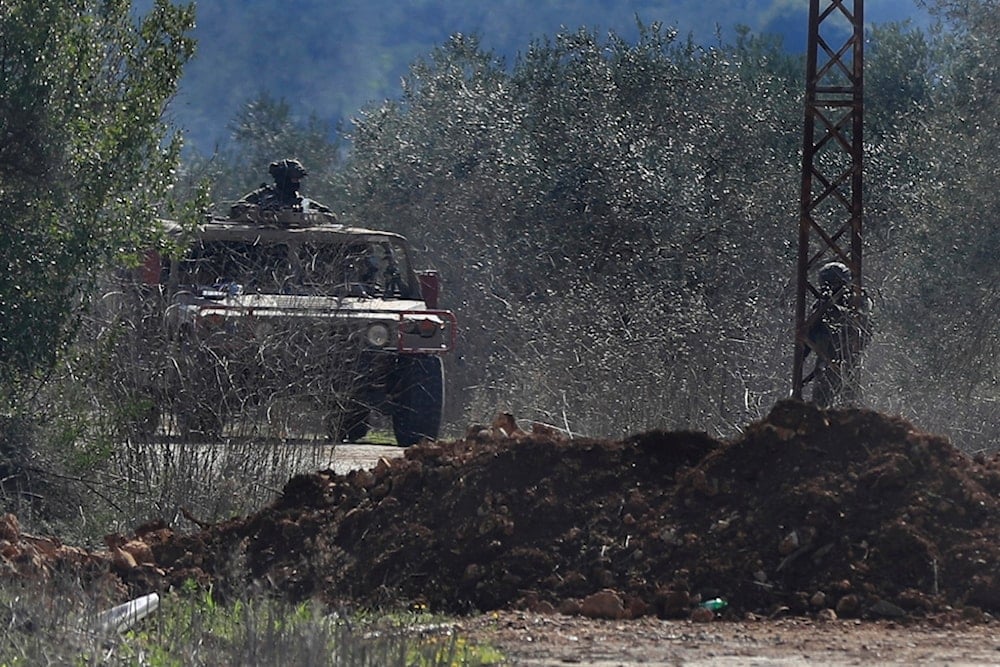Israeli military says it will stay in Lebanon after ceasefire extended
The Lebanese Presidency denied reports of an agreement between Lebanon and "Israel" to extend the ceasefire beyond Eid al-Fitr.
-

Israeli soldiers take their positions as they block a road leading to the southern Lebanese village of Kfar Kila, Lebanon, Sunday, Feb. 2, 2025 (AP Photo/Mohammed Zaatari)
Israeli occupation forces will remain in southern Lebanon after the implementation time for the Lebanon ceasefire agreement has been extended, the Israeli occupation military's spokesperson Avichay Adraee posted on X on Wednesday.
A Lebanese official and foreign ambassador told Reuters on Wednesday that the Israeli occupation has requested to keep its troops in five sites in southern Lebanon until February 28.
Israeli media also reported that "Israel" has reached an agreement with US President Donald Trump's administration for its military to remain beyond the Lebanese border until further notice.
The Israeli channel Kan cited Israeli cabinet ministers as saying that "Israel" has received US approval to remain at several locations in Lebanon beyond the scheduled withdrawal date.
But the Israeli news outlet Central Edition recently reported that the United States has conveyed a message to "Israel" stating that the ceasefire with Lebanon will not be extended and the withdrawal of Israeli troops from southern Lebanon must take place on February 18.
According to a ceasefire agreement reached in November between Lebanon and "Israel", the Israeli occupation military had until January 26 to withdraw from southern Lebanon.
The agreement has already been extended until February 18 but the sources said "Israel" had requested an additional extension through the committee supervising the ceasefire.
Israeli GLZ radio reported that Israeli Major General Ori Gordon said Wednesday he thinks "we will indeed reposition ourselves next week and the agreement will be implemented."
However, the Lebanese Presidency denied reports of an agreement between Lebanon and "Israel" to extend the ceasefire beyond Eid al-Fitr, adding that President Joseph Aoun has repeatedly affirmed Lebanon's insistence on the full withdrawal of the Israeli military within the specified deadline on the 18th of this month.
In the same context, the media office of Lebanese Parliament Speaker Nabih Berri denies reports of an agreement between Speaker Berri and Hezbollah to extend the ceasefire with "Israel".
Lebanese Prime Minister Nawaf Salam affirmed on Tuesday evening that he will work to ensure the Israeli withdrawal is completed on time, or even before the scheduled date. He stated, "We will exert pressure on Israel through diplomatic channels."
In his first televised interview, conducted from the Grand Serail, Salam said, "Lebanon has fulfilled its role in implementing UN Resolution 1701 and its monitoring mechanism. We are not falling short in our commitments."
He noted that the ministerial statement will address the challenges facing the country, particularly the Israeli withdrawal and reconstruction efforts.
Aoun calls for Israeli accountability
At a recent meeting with US Deputy Special Envoy to the Middle East, Morgan Ortagus, at Baabda Palace, Lebanese President Joseph Aoun reaffirmed that lasting stability in southern Lebanon depends on "Israel's" full withdrawal from occupied territories and complete implementation of UN Resolution 1701.
He also emphasized that the release of Lebanese detainees remains an integral part of the agreement and called for an immediate halt to Israeli hostilities.
"Israeli assaults must cease, including the killing of innocents and soldiers, the destruction of homes, and the bulldozing and burning of agricultural lands," Aoun stated.
The Lebanese Army has committed to fully deploying in areas vacated by Israeli forces, with Aoun stating that the army is prepared to assume security control over the villages and towns affected by the occupation.
He also underlined Lebanon's ongoing cooperation with international forces to ensure the full implementation of Resolution 1701 and gradually restore normal life in liberated areas.

 4 Min Read
4 Min Read








